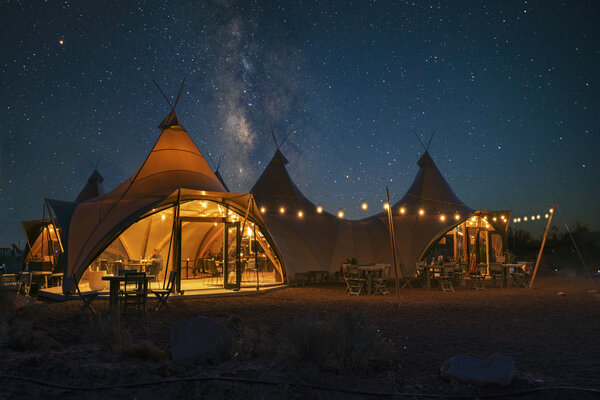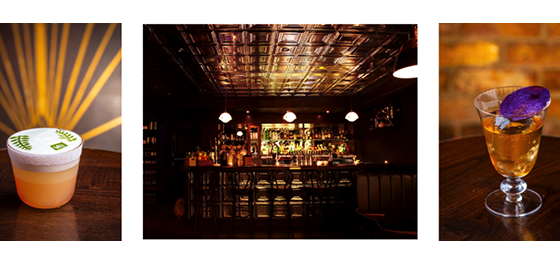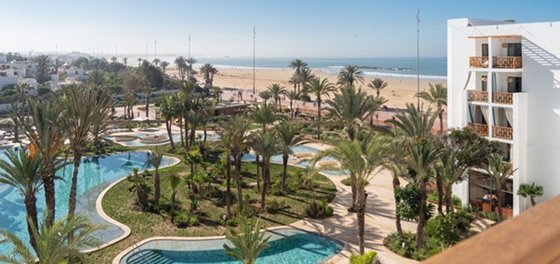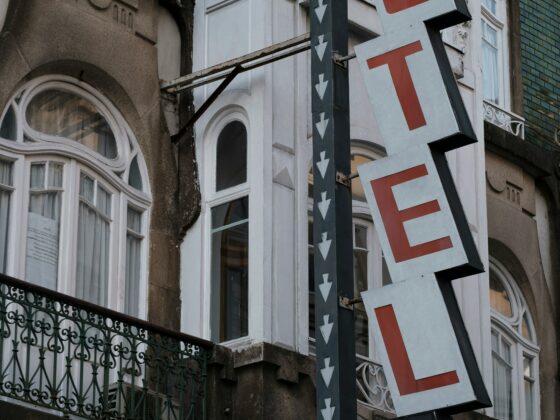For more than a decade, the embrace of the great outdoors as a strong, ROI-churning lodging environment has been the bailiwick predominantly of investors and entrepreneurs. This year saw a shift in that paradigm, with key hotel mega chains deciding they wanted in.
In February, Hilton made a foray into what’s colloquially known as “glamping”—a mash-up of glamour and camping—by partnering exclusively with Santa Barbara, Calif.-based AutoCamp, known for its use of classic Airstream travel trailers, whose rounded, polished aluminum exteriors hark back to the 1930s.
Hyatt got in the game in July, partnering with Under Canvas, an upscale outdoor hospitality company whose majority owner is KSL Capital Partners, bringing 13 eclectic destinations, including its new ULUM brand, into World of Hyatt via its Mr & Mrs Smith brand platform.
For both Hilton and Hyatt, the moves were a play outside traditional lodging and, of course, a huge boost to their loyalty programs, adding more optionality.
According to Oral Muir, Hilton’s VP of partnerships, experiences and distribution, the initiative was a collaborative one, with both companies looking to combine strengths and complementary experiences. “Hilton’s desire to enrich the Hilton Honors program with more diverse and nature-focused experiences was pertinent, especially as we observed our members’ growing interest in outdoor and eco-friendly travel,” he said, noting the launch led right into the peak summer travel season.
Muir added that offering this lodging option is expected “to generate additional revenue streams and engagement with our loyal Hilton Honors members seeking new ways to stay/earn and redeem their points.”
The partnership between the two companies did not come out of providence, AutoCamp CMO Bryan Terzi noted, but through the brokerage of real estate private equity firm Whitman Petersen, an ownership group and strategic partner, which helped to bring the two brands together. And the play is not only a customer-facing one: “The partnership makes AutoCamp and the Hilton affiliation more attractive to potential developers,” Terzi said.
There are currently six open AutoCamp locations: Cape Cod, Mass.; Catskills, N.Y.; Joshua Tree, Russian River and Yosemite, all in California; Zion, Utah; two set to open later this year in Asheville, N.C., and Sequoia, Calif.; and a Hill Country, Texas, property slated for 2025. (The Asheville project did sustain damage from Hurricane Helene that will delay the official opening date.) “We are always looking for future AutoCamp locations, particularly places with access to stunning outdoor recreation,” said Terzi.
Delivering access to extraordinary sites within off-the-beaten-path locations also resonated with Hyatt, according to Laurie Blair, VP, head of global marketing. “Travelers are looking for new and unique experiences to reconnect with nature,” she said. “By adding these luxury outdoor camps to World of Hyatt, we are bringing more memorable travel experiences for our guests and members to some of the most sought-after and spectacular destinations in the United States.
Under Canvas, originally founded by Sarah and Jacob Dusek in 2009, opened its first location in 2012 in West Yellowstone, six miles outside Yellowstone National Park. Locations, which occupy anywhere from 40 to 750 acres, operate, expectedly, in outdoorsy destinations: Maine, Utah, Arizona, Tennessee, South Dakota, Montana, California, and with a recent and new luxury destination, ULUM Moab. Under Canvas Yosemite in Groveland, Calif., is slated to open in May 2025.
“Coming into this relationship with Hyatt, our revenue was already growing, both overall and in same-store locations,” said Under Canvas CEO Matt Gaghen, who was previously a principal at KSL Capital Partners. “Our relationship with Hyatt will help us boost revenue even more and ramp up new locations faster.”
Routing the Under Canvas offerings through the Mr & Mrs Smith luxury travel platform that Hyatt acquired last year also is expected to draw fresh attention. Hyatt has integrated more than 700 of the platform’s hotels globally, with a goal of 1,000 by year’s end. “While we’ve seen significant growth in the awareness of Under Canvas and ULUM, Hyatt has considerably more global reach and engagement with customers who are representative of our target customers,” said Gaghen.
Blair said the strategic alliance already has generated “tremendous interest” from World of Hyatt members, with Under Canvas destinations receiving “multiple bookings.”
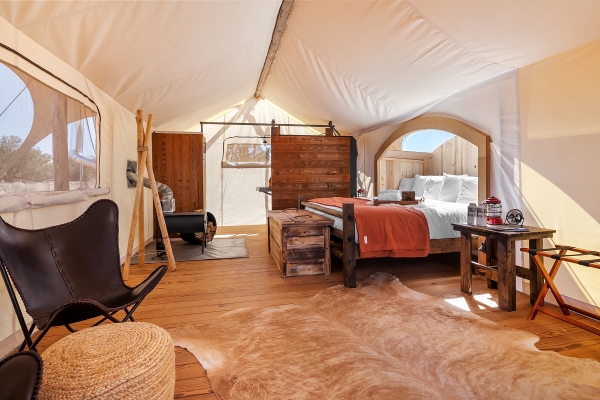
OUTDOOR INFRASTRUCTURE
Outdoor lodging experiences are a hot trend, residue, perhaps, from the pandemic that made people either retreat inside, alone, or escape to the vast outdoors, in open air, free from confined spaces and others.
Companies like Autocamp and Under Canvas also made “the woods” palatable for people who wouldn’t dream of spending a night in a pup tent. Branded lodging companies have now given these types of offerings credibility and reliability.
For example, Terzi said at the heart of each AutoCamp is a Clubhouse, designed with a mid-century modern aesthetic and decorated to reflect the specific locale. “This acts as a social hub for all-day food and beverage options from The Kitchen, as well as a curated selection of retail merchandise and grab-and-go options in The General Store,” he said, noting Clubhouses are surrounded by common areas that include a communal fire pit. Some locations, including Yosemite and Catskills, also feature pools and hot tubs. All locations, which range from 14 to 37 acres, offer free WiFi and most operate all season.
In addition to its 31-foot Airstreams, AutoCamp also makes available a “Happier Camper,” basically a room for two on wheels with controlled heating (albeit without bathroom facilities, which are found at the Clubhouse), luxury tents and the “Classic Cabin” with bedroom, bathroom, kitchen with stovetop and living area. Classic Suites are sited closer together and toward the front of a property while Premium Suites are further in and more secluded. The forthcoming Asheville location will debut the Bambi Suite, geared for solo travelers or couples.
“We’re witnessing several exciting trends and development in outdoor travel,” said Terzi. “People are looking for unique experiences that allow them to connect with the outdoors without sacrificing the comforts of home, which aligns perfectly with our mission.” He noted there’s increased traveler interest in destinations and accommodations that prioritize environmental stewardship, outdoor activities, such as hiking and biking—not to mention yoga and cooking s’mores—and an environment that welcomes multigenerational guests.
“The demographic varies. We are starting to see a nice mix of Gen Z and Baby Boomers come together around the campfire, which is the best dynamic on property,” he said, adding that 2.3 nights is the average length of stay.
With the Hilton alliance, he expects to see a wider range of guests from not just drive-in markets, but primary city destinations, as well as more international growth from Asia and the United Kingdom.
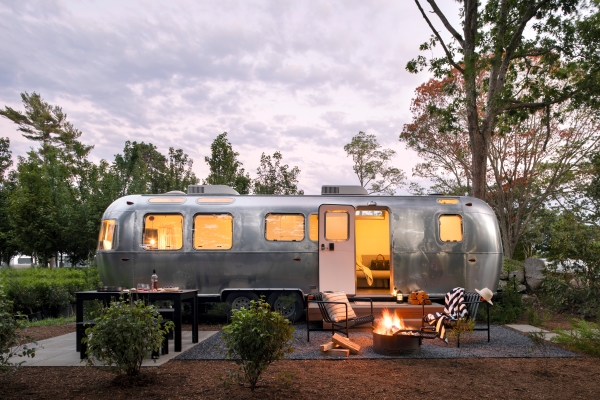
OUTSIDE NOISE
Outdoor lodging and experiences are not a fad. Indeed, Hilton’s “2025 Trends Report” stated that one in four travelers plan to seek unique experiences and 20% will aim for outdoor adventures.
“This shift reflects a growing desire for meaningful, immersive experiences that allow travelers to connect with nature and escape the confines of everyday life,” Muir said, adding Hilton Honors members also can earn or redeem points to fuel future stays, “making these experiences worthwhile investments.”
“The need to disconnect from our fast-paced, demanding and digital lives in order to maintain mental and physical health is becoming increasingly more apparent,” said Gaghen. “Our national parks and remote, destination/recreational areas are a spectacular asset that travelers around the globe are seeking to experience, but not at the cost of comfort.” Under Canvas has made it a focus to refine its offerings and not sacrifice high-end and hotel-style amenities, just because of the rustic settings.
Bringing accommodations to modern-day hinterlands takes strong financial support. A new Under Canvas location can cost up to $25 million to build out. Gaghen acknowledged KSL Capital as “a great partner,” not only in providing equity capital to fund new locations but by also delivering “significant market and operating know-how” based on depth of experience in the travel sector. Blackstone also has been a lender to Under Canvas.
Funds also are re-invested into existing locations and the CEO said Under Canvas expects to open up to three new locations per year going forward.
All Under Canvas locations are seasonal, although much of the infrastructure remains in place. This includes the camps’ main lobby tents, where guests enjoy communal space and house F&B operations, as well as structural elements and utilities related to en-suite bathroom tents.
“At ULUM, we do offer a permanent, temperature-controlled lobby lounge that assimilates organically into its surrounding environment with floor-to-ceiling, folding glass panels that open to a cascading verandah, framing the unencumbered desert and national park views, and adjacent Looking Glass Arch,” said Gaghen. The lobby lounge incorporates guest check-in, a small boutique area, relaxation space, full-service restaurant and houses an espresso and smoothie bar. ULUM Moab also offers hot and cool dipping pools, outdoor showers, yoga deck and games area.
ULUM is Under Canvas’ luxury brand, which offers all-suite accommodation tents and amenities that would be at home in a luxury hotel setting. Included are Turkish cotton Parachute linens and robes, West Elm furnishings, en-suite bathrooms with rain shower, Aesop bath products and specialty programming, including things like morning yoga or sound-bowl meditation.
Under Canvas conserves resources via pull-chain showers, low-flow toilets, faucets that automatically shut off, low-level lighting and a towel-reuse program. Rechargeable USB battery packs are used in guest tents in lieu of electricity and Rivian Waypoints electric vehicle charging stations are available at select locations.
Unlike AutoCamp, one feature not offered at any Under Canvas property is WiFi. Gaghen said most guests stay for two or three nights, with some staying upwards of five nights and others spending a few nights at multiple camps, particularly in what it terms its five “Grand Circle” camps in Arizona and Utah, where the properties have earned certification from DarkSky International, which seeks to preserve and protect nocturnal skyscapes.
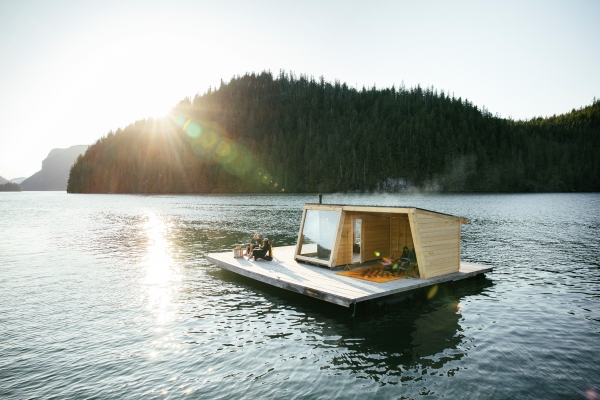
A DIFFERENT LOOK
The alliances have provided a pathway for the hotel chains to enter a universe largely dominated by companies founded and nurtured by individuals—many with career roots in traditional hotels—who were looking to expose guests to a different way of experiencing a destination. Collective Retreats is one such entity. CEO Peter Mack founded the Colorado-based company in 2015 after serving as VP of product innovation at Tough Mudder, a lifestyle, events and media company, and following more than a decade at Starwood Hotels and Resorts.
Preferring to call the sector “nature-based hospitality,” Mack sees it increasingly becoming a significant growth vehicle for the lodging industry. “This trend is not only attracting more guests who seek a connection to nature, but it is also drawing the attention of a growing number of investors and institutional players,” he said. “The sector aligns with broader lifestyle trends and responds to evolving customer desires, particularly the need for experiences that go beyond what traditional hotels can offer.”
A certified B-Corp., the company is owned by Mack with third-party stakeholders that are a mix of real estate, venerable growth and hospitality investors. Among these are Fireside Investments, Outdoorsy, Altos Ventures, First Round Capital and Revolution’s Rise of the Rest Seed Fund. Over its 10-year life cycle, Collective Retreats has attracted over $40 million in investment, primarily equity, with funds raised through hospitality networks and those interested in nature-based hospitality. “We have become a lightning rod for investors seeking to build pioneering assets in nature-based hospitality,” Mack said.
He noted such capital infusions have supported three major avenues for Collective Retreats: expansion of its portfolio to include a second brand called The Conservatory Collective, a soft-brand collection with more than 75 international members; creation of a scalable management platform in the sector wherein it manages assets under both brands for real estate investment owners; and the fast-tracking of R&D and sector knowledge into state-of-the-art prototypes and experiences at its locations.
Current destinations include Governors Island in New York City; Hill Country, Texas; Vail, Colo.; and Tumbling River Ranch two hours outside Denver. It also manages El Cosmico, Marfa, Texas, as part of The Conservatory Collective.
Like other outdoor outlets, Creative Retreats offers a mix of accommodations that range between $85,000 and $350,000 to set up across anywhere from seven to 30 acres with the number of “units” ranging from 12 to 60.
“This [set-up] range reflects the customization based on location, climate and the type of facility,” said Mack. For instance, a soft-walled tent represents the lower end of that range, while the higher end encompasses hard-walled structures with advanced air conditioning and premium amenities, he mentioned. “Villas, with their luxurious features and hard walls, fall into the upper echelon of this spectrum.”
There also are some permanent structures at the sites. These typically include hub assets, like a main lodge, soaking tubs, event spaces and restaurants. The portfolio contains several different hold structures, including public-private partnerships, such as Collective Governors Island, which is on leased land from the City of New York; private land that is leased by Collective Retreats; or owned by its partners. Mack said the average cost of investment ranges from close to $1 million to $30 million, depending on the destination, which may be year-round or seasonal.
In terms of industry performance metrics, the CEO shared luxury units achieve more than $800 ADR at Collective Governors Island. “In season, we consistently outperform industry comps,” he said.
Collective Retreats has just started to expand internationally from a management perspective and has announced it has been selected to open a sustainable property in Trojena in the mountains of Saudi Arabia’s NEOM project. Its Conservatory Collective runs the global gamut from North, Central and South America to Europe, the Middle East and Africa to the Maldives and Antarctica.
“We know that our audience of U.S.-based nature enthusiasts are not only looking for places to travel domestically but also internationally, so growing through management and affiliation has allowed us to give this audience more options to choose from,” said Mack.
Mack is skeptical of critics who suggest the entire glamping concept is disruptive to formerly pristine environments. “Connecting people to beautiful places in nature empowers them to protect those places,” he said.
Story contributed by Stefani C. O’Connor.
